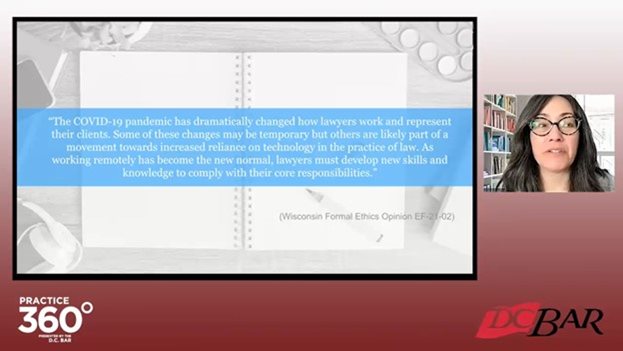Issues & Trends
A Reminder of the Ethical Pitfalls of Remote Work
October 04, 2022
For better or worse, COVID-19 has transformed the practice of law. The legal world adapted to remote work.png?width=300&height=200) and virtual court proceedings at the height of the pandemic, but will those options remain as lawyers slowly return to the formal office setting? More importantly, how are jurisdictions addressing the potential ethical risks of virtual work?
and virtual court proceedings at the height of the pandemic, but will those options remain as lawyers slowly return to the formal office setting? More importantly, how are jurisdictions addressing the potential ethical risks of virtual work?
Niki Black, a legal technology expert at MyCase who spoke at the D.C. Bar Practice Management Advisory Service’s Practice 360° conference last month, said that lawyers were forced to learn how to use more technology and, more importantly, to use it securely. Citing a 2021 MyCase survey of more than 2,000 legal professionals, Black said 88 percent of respondents said their law firms used cloud-based software — up from 76 percent before the pandemic. Approximately 46 percent reported that they invested in remote-working software because of the pandemic.
Because teleworking brings up legal ethics issues, attorneys were also reminded of their ethical obligations regarding data protection and technological competence. Under the Michigan Rules of Professional Conduct, for example, lawyers have an ethical obligation to understand technology and to take reasonable steps to implement cybersecurity measures. This follows Comment [8] to ABA Model Rule 1.1: “To maintain the requisite knowledge and skill, a lawyer should keep abreast of changes in the law and its practice, including the benefits and risks associated with relevant technology, engage in continuing study and education and comply with all continuing legal education requirements to which the lawyer is subject.”

“The vast majority of other jurisdictions have adopted this definition of technology competence as part of lawyers’ ethical duties on competence,” Black said. At least one jurisdiction (New York) requires continuing legal education in cybersecurity, privacy, and data protection, said Black. “It’s sort of the wave of the future. We can expect more of this across other jurisdictions over time.”
In the District of Columbia, LEO 371 states, “We agree with ABA Comment [8] to Model Rule 1.1. … Although the District's Comments to Rule 1.1 do not specifically reference technology, competent representation always requires the legal knowledge, skill, thoroughness, and preparation reasonably necessary to carry out the representation. Because of society's embrace of technology, a lawyer's ignorance or disregard of it, including social media, presents a risk of ethical misconduct.”
In Pennsylvania, it is ethical for attorneys to use cloud-based computing so long as they exercise “reasonable care” to protect confidential electronic information, including understanding different levels of encryption, Black said.
Black also cited ABA Formal Opinion 477R, stating that it is not always reasonable to use unencrypted email to communicate electronically. “Emails that are not encrypted are like sending postcards in the post office,” Black said.
As for conducting Zoom meetings, Black referenced a legal ethics opinion issued by the Pennsylvania Bar Association in April 2020, specifying that Zoom meetings should not be made public, that passwords should be required for all participants, and that only the hosts should have control over the meeting.
“Make sure users are using the most updated versions of the software because that’s where a lot of the security issues come in,” Black advised attendees.
Another concern arising out of remote work during the pandemic is attorneys running afoul of rules regarding unauthorized practice of law while teleworking from jurisdictions in which they are not licensed to practice. The ABA broadly addressed this issue in Formal Opinion 495, said Black.
For attorneys living in, but not barred in the District of Columbia, Black directed attendees to Opinion 24-20 (Teleworking From Home and the COVID-19 Pandemic) issued by the D.C. Court of Appeals Committee on Unauthorized Practice of Law in March 2020, “identifying circumstances in which persons who are not District of Columbia bar members may practice law from personal residences or other locations within the boundaries of the District” under Rule 49(c)(13).
Outside of the pandemic, lawyers who practice from their residences in the District of Columbia who are not licensed in the District should consult the incidental and temporary practice exemption to DCCA Rule 49 and its commentary and, if they have further questions, contact the District of Columbia Committee on Unauthorized Practice.
Read more about our coverage of this year’s Practice 360° here.


